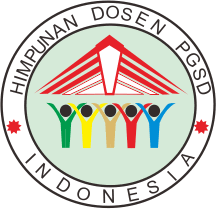PENGARUH METODE OUTDOOR STUDY TERHADAP KECERDASAN EKOLOGIS ASPEK KOGNITIF MURID SEKOLAH DASAR ADIWIYATA KELAS V SE-KECAMATAN LAWEYAN
Abstract
Abstract. This study aims to examine the effectiveness of the outdoor study method in enhancing ecological intelligence in the cognitive aspect among fifth-grade elementary school students in Adiwiyata schools in Laweyan District. While outdoor learning is known to promote environmental awareness, its impact on cognitive ecological understanding remains underexplored in the elementary context. One experimental class used outdoor study as part of a quasi-experimental design, whereas the control class used traditional classroom instruction. The Wilcoxon signed-rank test, Mann-Whitney U test, and effect size calculation were used to examine the data, which were gathered utilizing pretests, posttests, and N-Gain analysis. The experimental group's posttest scores significantly outperformed the control group, according to the results, which also indicated a larger effect size and higher N-Gain score. These results imply that outdoor study enhances students' ecological cognitive abilities more than traditional approaches. However, successful implementation requires contextual learning activities and active engagement with the local environment. The study reinforces the importance of experiential learning in fostering meaningful understanding of environmental issues in early education.
Keywords
References
A. Fauzi, S. Fitriasari, and D. I. Muthaqin, “Development of Student Ecological Intelligence Through the Implementation of Ecopedagogy,” Proc. Annu. Civ. Educ. Conf. (ACEC 2021), vol. 636, no. Acec 2021, pp. 554–557, 2022, doi: 10.2991/assehr.k.220108.099.
M. S. Handayani and I. Ichsan, “Peran Lingkungan Agraris dalam Membentuk Kecerdasan Naturalis pada Anak Usia Dini,” vol. 5, no. 1, pp. 1–16, 2025, doi: 10.21580/joecce.v5i1.26436.
S. A. Bahrun, R. Ramlawati, and H. Hasanuddin, “Pengaruh Penggunaan Metode Outdoor Study Terhadap Peningkatan Hasil Belajar Ipa Peserta Didik Pada Materi Klasifikasi Makhluk Hidup Kelas Vii Mts Ddi Kanang,” J. IPA Terpadu, vol. 4, no. 2, pp. 20–29, 2021, doi: 10.35580/ipaterpadu.v4i2.12036.
Y. C. for E. L. & P. dan C. for I. E. S. I. N. E. I. C. University, “Environmental Performance Index (EPI) 2022,” Environmental Performance Index. Accessed: Jul. 21, 2024. [Online]. Available: https://epi.yale.edu/epi-results/2022/component/epi
D. L. Pristiandaru, “Indonesia Peringkat Bawah dalam Skor Keberlanjutan Lingkungan,” KOMPAS.COM. Accessed: Jul. 21, 2024. [Online]. Available: https://lestari.kompas.com/read/2023/05/15/130000586/indonesia-peringkat-bawah-dalam-skor-keberlanjutan-lingkungan
N. Pariani, I. P. Sriartha, and I. W. Kertih, “Pengaruh Metode Outdoor Study Berbasis Subak Dalam Pembelajaran IPS Terhadap Sikap Sosial Dan Sikap Ekologis Siswa Sekolah Dasar Kecamatan Abiansemal Kabupaten Badung,” vol. 20, no. 2, pp. 106–117, 2021.
Y. A. Feriandi, D. Budimansyah, and K. Komalasari, “Studies on the Ecological Competence of Civic Education in Primary Schools,” Madrasah J. Pendidik. dan Pembelajaran Dasar, vol. 13, no. 2, pp. 173–185, 2021, doi: 10.18860/mad.v13i2.12291.
N. Lusiana, J. I. S. Poerwanti, and M. Matsuri, “Hubungan antara motivasi belajar dan disiplin belajar dengan keterampilan berpikir kritis ips materi interaksi manusia dengan lingkungan dan pengaruhnya pada anak didik kelas v.,” Didakt. Dwija Indria, vol. 9, no. 1, pp. 76–81, 2021, doi: 10.20961/ddi.v9i1.48771.
J. W. Santrock, Educational Psychology (probable ed. 7th or 8th). New York: McGraw‑Hill Education, 2011.
E. Hasanah, Zultiyani, Burhanudin, and M. Ikhsan Al Ghazi, “Membangun Kecerdasan Ekologis: Best Practice Implementasi Pendidikan Adiwiyata di Sekolah Dasar,” Jmp-Dmt, vol. 5, no. 2, pp. 187–196, 2024.
F. A. Setiawan and A. N. Saputra, “Outdoor Learning to Improve the Wetland Ecological Literacy of Geography Education Students,” Geosfera Indones., vol. 7, no. 1, p. 72, 2022, doi: 10.19184/geosi.v7i1.27782.
Suparno, Filsafat Konstruktivisme dalam Pendidikan. Yogyakarta: niversitas Sanata Dharma Press, 2017.
I. R. W. Wardani, M. I. Putri Zuani, and N. Kholis, “Teori Belajar Perkembangan Kognitiv Lev Vygotsky dan Implikasinya dalam Pembelajaran,” DIMAR J. Pendidik. Islam, vol. 4, no. 2, pp. 332–346, 2023, doi: 10.58577/dimar.v4i2.92.
R. E. Slavin, Educational Psychology: Theory and Practice, 9th ed. Boston: Pearson Education, 2009.
Isna Aulia Adzani, Kharisma Nurul Azizah, Nur Joan Adiwinata, and Wulan Marthania, “Implementasi Ekopedagogi Dalam Pembelajaran Sekolah Dasar : Meningkatkan Kesadaran Lingkungan Dan Keterlibatan Siswa,” J. Pendidikan, Bhs. dan Budaya, vol. 3, no. 1, pp. 106–115, 2024, doi: 10.55606/jpbb.v3i1.2730.
A. F. D. Jazuli Yusup, H. N. Fauziah, M. K. Anwar, and T. Sayekti, “Efektivitas Model Pembelajaran Kontekstual dengan Pendekatan Outdoor Learning terhadap Kemampuan Menyelesaikan Masalah Peserta Didik,” J. Tadris IPA Indones., vol. 1, no. 3, pp. 305–313, 2021, doi: 10.21154/jtii.v1i3.191.
L. B. Maryanto, H. Mulyono, and S. Sularmi, “Penerapan model problem based learning untuk meningkatkan sikap peduli lingkungan pada muatan pelajaran ipa peserta didik kelas iv sekolah dasar,” Didakt. Dwija Indria, pp. 1–5, 2019.
H. K. Aminah, S. Sukarno, and S. Yulisetiani, “Analisis Implementasi Program Sekolah Sehat dalam Membangun Karakter Peduli Lingkungan di Sekolah Dasar,” Didakt. Dwija Indria, vol. 10, no. 4, pp. 1–6, 2022.
Sugiyono, Metode Penelitian Kuantitatif, Kualitatif, dan R&D, 3rd ed. Bandung: Alfabeta, 2023.
J. Junaedah, S. B. Thalib, and M. A. Ahmad, “The Outdoor Learning Modules Based on Traditional Games in Improving Prosocial Behaviour of Early Childhood,” Int. Educ. Stud., vol. 13, no. 10, p. 88, 2020, doi: 10.5539/ies.v13n10p88.
N. Kadek, P. Dewi, and W. Wiarta, “Pengaruh Model Project Based Learning Berbantuan Outdoor Study Terhadap Kompetensi Pengetahuan IPA dengan Mengontrol Kemampuan Awal Siswa Sekolah Dasar,” J. Ilm. Pendidik. Profesi Guru, vol. 6, no. 2, pp. 288–297, 2023.
T. N. Wulandari, L. E. Kusumaningtyas, and O. Irmade, “Peningkatan Kecerdasan Naturalis Dengan Pembelajaran Outdoor Di Kelompok B Tk Rumah Pelangi Colomadu,” J. Audi, vol. 3, no. 1, p. 1, 2018, doi: 10.33061/ad.v3i1.2058.
R. Handayani, I. G. Noor, and R. S. Dewi, “Peran Pendidikan Karakter Peduli Lingkungan di Sekolah dalam Membentuk Generasi Cerdas dan Bertanggung Jawab terhadap Kelestarian Alam,” Ainara J. (Jurnal Penelit. dan PKM Bid. Ilmu Pendidikan), vol. 5, no. 3, pp. 372–377, 2024, doi: 10.54371/ainj.v5i3.560.
Refbacks
- There are currently no refbacks.



